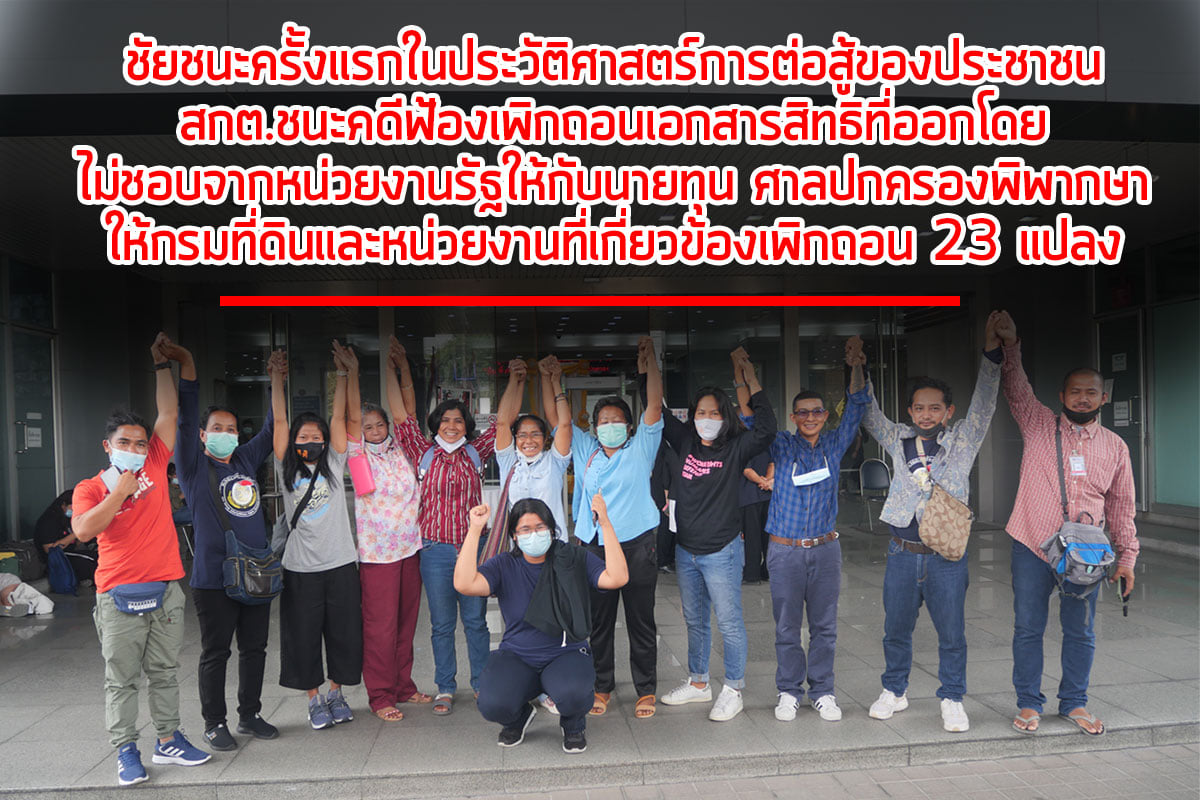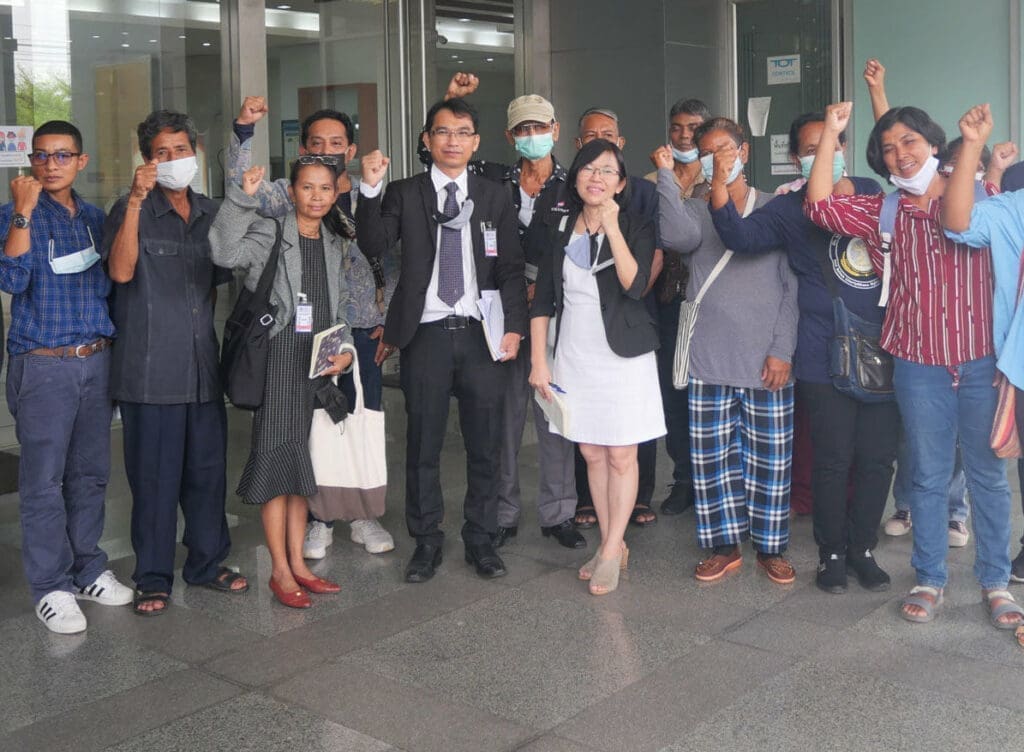The Southern Peasants’ Federation finally wins court case after eight years of deliberations and delays
[Thailand – 25 March 2021]
Thirteen years of struggle and eight years of waiting finally resulted in a positive outcome for the land rights defenders of the Southern Peasants’ Federation of Thailand (SPFT). On 19 March 2021, the Thai Administrative Court ordered the Department of Land and its affiliated authorities to revoke title deeds for 23 plots that had been unlawfully issued to palm oil plantations. The Court found the Directors General of Department of Land and Forestry Department have neglected their duties and the deeds must be retracted within 180 days. Lawyers say the Court has ruled that the villagers have legal standing to bring the case to the court as well as the right to use natural resources within the land allocated by the State. This decision is the first of its kind for the SPFT and many hope that the Department of Land will not appeal the verdict.
The SPFT, their lawyers from the Lawyers Council of Thailand and Protection International attended the 19 March court hearing for the verdict of the case concerning 20 land rights defenders of the Santi Pattana Community, who are members of SPFT, against the Department of Land (DOL), the Director General of DOL, the Committee of Enquiry under Section 61 of the Land Code, the Forestry Department, land officer of the Phasaeng District, Surat Thani and the palm oil company. The Director General of the Department of Land, who has failed to revoke the illegal land titles, is found to have committed negligence of his duties as prescribed by law. The Department of Land, according to the lawsuit, is asked to revoke the unlawful title deeds while the Forestry Department is asked to promptly take legal action against the palm oil plantation that has encroached on the forested area. The United Palm Oil Industry, PLC is to be removed from the land so that it can be reallocated to serve the community title deed program, which was created to ensure sustainability, serve justice and minimize land inequality.
Mr Sorakrai Sornsri, a human rights lawyer representing the lands rights defenders in this case, noted that another verdict is soon expected from the Central Administrative Court on the revocation of N.S.3 title deeds and other land titles issued to investors who occupy forested areas. “Their actions have deprived the villagers and their communities of their right to use natural resources and villagers have been targeted with SLAPP lawsuits in several cases. We have been fighting in the court for eight years and today’s verdict is a blessing for the struggle of the villagers of Santi Pattana Community,” said Mr Sorakrai.
Importantly, the verdict of the Administrative Court proves how the villagers of Santi Pattana Community have the right to bring their case forward. In previous cases, the question of legal standing has been an issue. The community has been forcibly evicted from the land and sued several times, which has caused them tremendous suffering due to the unlawful issuance of title deeds. The villagers have been insisting that the respective agencies investigate the situation for years, but the authorities failed to properly acknowledge the issue and follow up with actually revoking the deeds. Now, the Court has ruled to uphold the right to collectively use natural resources and the right to preserve the forest area by the existing community. Thus, the villagers have legal standing to file the case with the court.
Now, it is critical to monitor the reaction of the concerned authorities, including the Forestry Department, to ensure they act in compliance with the court order. Villagers plan to submit letters of petition to the prime minister and other concerned authorities to demand the Administrative Court’s verdict is upheld and executed. Previously, the United Palm Oil Industry, PLC filed civil suits to evict the villagers from the land. At present, an inquiry is being conducted to determine if the villagers can continue living on the land in light of these lawsuits. However, as a result of this hearing, human rights lawyers affirm that the company should no longer have the power to evict the community. According to the verdict, the removal of the company must be done within 180 days.
Ms Nutthaphan Saengthap, a woman human rights defender from SPFT, explained, “We are thrilled and very happy to hear the verdict in this case. We didn’t imagine we could achieve this big win. Our struggle has been protracted for the past 13 years, and we have been waiting for a decision from the Administrative Court for eight of those years. Today, we can now proudly say that we, the villagers, have the right to use the land.”
Ms Pranom Somwong, from Protection International Thailand, says that this case should set a precedent for future inquiries into the unlawful processing of land titling by the State. Titles are often offered to investors, which is this case are the palm oil plantations, without consideration of the communities that continue to live on their historic land. “HRDs can play an important role in investigating unlawful procedures abetted by public agencies and enhance human rights due diligence, which is critically important for the implementation of business and human rights principles,” says Ms. Somwong, “Until now, the judicial system has been used by the State or businesses as a tool for harassment and it has significantly hampered the work of HRDs in Thailand. This is a breach of the UN Guiding Principles on Business and Human Rights.”
The Administrative Court’s verdict in this case helps to uphold justice and compels public officials to right their wrongs as a result of long-overdue negligence. We hope that the Department of Land will not appeal the verdict and immediately proceed to revoke the title deeds. “This should serve as their minimal redemption for the mistake that they have been profiting from for years,” says Somwong.



